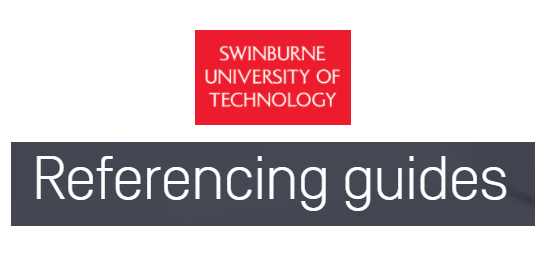
SWINBURNE CITATION
The Swinburne Harvard Style is a variation of the Harvard citation style, used at Swinburne University of Technology. It follows an author-date system, with in-text citations providing the author's last name and the year of publication, and a reference list at the end of the document providing full publication details.
1. In-Text Citations
In Swinburne Harvard, in-text citations include the author's last name and the year of publication in parentheses. If quoting directly, you should also include the page number(s).
Format:
- (Author's Last Name Year, Page Number)
Examples:
-
Paraphrase:
(Smith 2020)
Technological advances have transformed education (Smith 2020). -
Direct quote:
"Technology has revolutionized education" (Smith 2020, p. 45).
If the author's name is mentioned in the sentence:
- Format:
Author's Last Name (Year)
Example:
Smith (2020) argues that technology has revolutionized education.
For multiple authors:
(Smith & Johnson 2020) for two authors, and (Smith et al. 2020) for three or more.
2. Reference List
The reference list in Swinburne Harvard is arranged alphabetically by the authors' last names and provides full publication details.
Format for Common Sources:
-
Books:
Author's Last Name, First Initial Year, Title of the Book, Publisher, Place of Publication. -
Journal Articles:
Author's Last Name, First Initial Year, 'Title of the Article', Title of the Journal, vol. number, no. number, page range. -
Websites:
Author's Last Name, First Initial Year, Title of the Webpage, website name, viewed Day Month Year, <URL>.
Examples for Different Sources:
Books:
In-text citation:
- (Smith 2020)
Reference list entry:
- Format:
Author's Last Name, First Initial Year, Title of the Book, Publisher, Place of Publication.
Example:
Smith, J 2020, The Evolution of Technology, HarperCollins, New York.
Journal Articles:
In-text citation:
- (Brown 2019)
Reference list entry:
- Format:
Author's Last Name, First Initial Year, 'Title of the Article', Title of the Journal, vol. number, no. number, page range.
Example:
Brown, E 2019, 'The Influence of Social Media on Mental Health', Journal of Psychology, vol. 12, no. 3, pp. 34–45.
Websites:
In-text citation:
- (Johnson 2020)
Reference list entry:
- Format:
Author's Last Name, First Initial Year, Title of the Webpage, website name, viewed Day Month Year, <URL>.
Example:
Johnson, P 2020, The Impact of Climate Change on Agriculture, The Environmental Blog, viewed 15 July 2022, <www.environmentalblog.com/climate-change-agriculture>.
3. Key Features of Swinburne Harvard Style:
- Author-Date System: The in-text citation includes the author's last name and the year of publication.
- Alphabetical Reference List: All sources are listed alphabetically by the authors' last names.
- Direct Quotes: When quoting, a page number must be provided.
- Multiple Authors: For two authors, use "&" in citations (e.g., Smith & Johnson 2020); for three or more, use "et al."
4. Special Cases in Swinburne Harvard Style
- No Author: If no author is available, use the title in place of the author’s name.
In-text citation:
(The Impact of Technology 2020)
Reference list entry:
The Impact of Technology on Education 2020, Tech Publishers, New York.
- Multiple Authors: For more than three authors, list the first author followed by "et al."
5. Why Use Swinburne Harvard Style?
Swinburne Harvard provides a straightforward approach to citation, ideal for academic writing across a variety of disciplines. It’s based on the widely-used Harvard style, making it easily recognizable and versatile for students and researchers. The use of in-text citations ensures that sources are clearly acknowledged, and the reference list at the end provides detailed information for readers to locate the sources used.